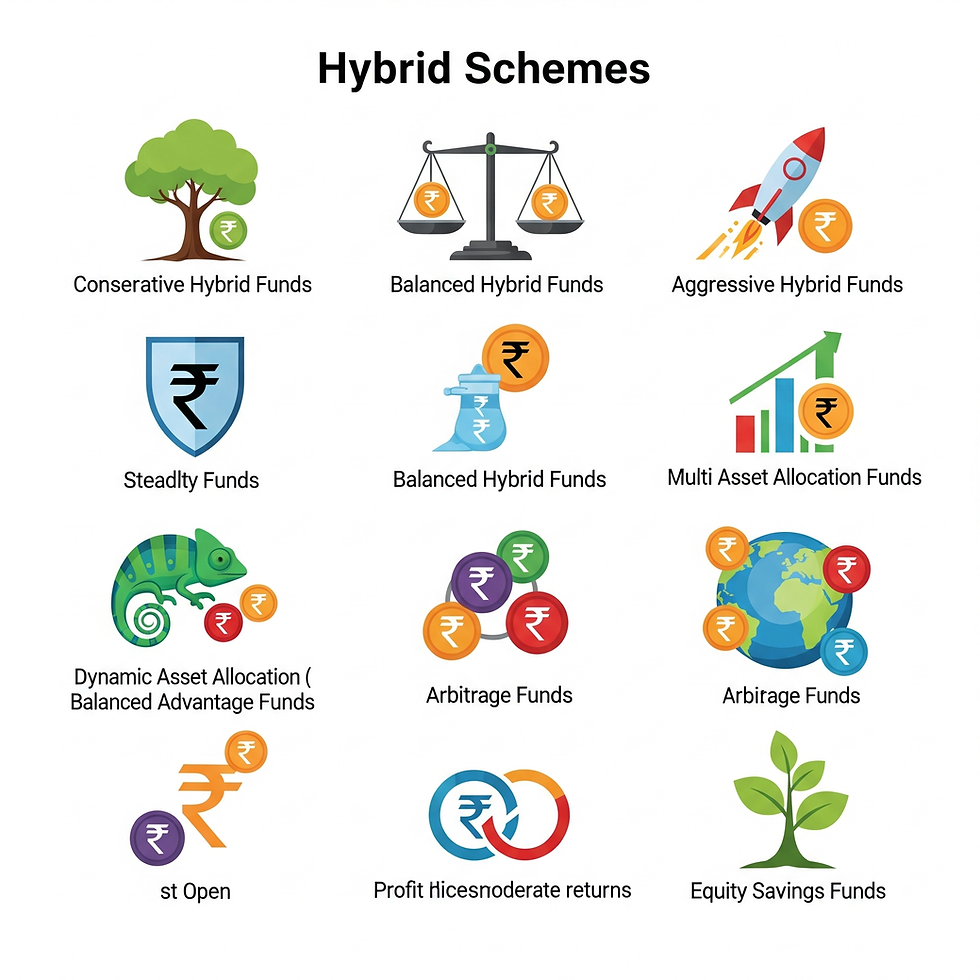Dividend vs Growth Option
- M Manohar Rao
- May 23, 2025
- 4 min read
Tags: Wealth Management, Investment Lesson, Mutual Funds, Stock market, Budget, Finance, Investing, Personal Finance, Investment
When investors consider an investment option, they worry simultaneously about several things. Is this investment tax‐efficient? Does it reduce or increase my tax liability? Does this investment grow in value? Does it provide a regular return like dividend or interest? If they choose an investment that provides regular income, like a bond or a deposit, they get no appreciation in the value invested. If they choose an investment that has the potential to appreciate, there is no regular income in the form of dividends. Mutual funds enable the best of both worlds. They give investors the option to choose dividends or growth. Investors can buy a debt fund and choose a growth option, thus opting for capital appreciation in a debt portfolio. Investors can buy an equity funds and choose a dividend option, to get regular income. Virtually all mutual fund products provide dividend and growth options to investors.
01.The dividend option aims at paying periodic dividends to the investor provided the fund has earned returns.
The dividend payment may be either ad‐hoc or at regular intervals like quarterly, half‐yearly or annual. The growth option provides long‐term capital appreciation to the investor which can be realized at any time the investor chooses. Consider for example an investment of Rs.10 in a fund. Assume that the NAV has moved up to Rs.12 over time. The fund may declare Re.2 as dividend and pay out the realised appreciation in a dividend option. In the growth option, the investor can sell off the units at Rs.12, and realize the growth in NAV
02.The additional consideration in choosing between dividend and growth options is the tax implication.
The tax treatment for dividends and capital gains (gains from selling a mutual fund unit at a profit) are different. Dividends from equity mutual funds are completely exempt from tax. Capital gains are taxed based on whether they are realized within a year (short term) or after a period of a year (long term). Dividends from other funds (funds that have less than 65% in equity) are also exempt from tax in the hands of the investor, but subject to a dividend distribution tax as stipulated by the government. This tax has to be paid by the fund directly to the government before dividends are paid to the investor. Capital gains from such funds are subject to tax, depending again on whether they are long term or short term. Therefore investors have a matrix of choices, to decide on the option they need. If they need income, they can choose the dividend option. If they need growth they can choose the growth option. If they need income, but do not want the dividend to be subject to distribution tax, they can choose a growth option, and realize their gains periodically to generate income. If they don’t need income, but will suffer a high tax on short term capital gains if they choose growth, they can choose the dividend option, and instead of a payout, reinvest the dividend in the same fund.
03.This way investors who need income can also choose the growth option, and investors who need growth can also choose the dividend option.
That is the flexibility that a mutual fund can offer to investors to manage their need for income and for saving taxes efficiently. It is important to know that the underlying portfolio is the same for both options. Therefore any difference in return to the investor comes only from the tax implication. Investors need to choose growth, dividend payout, or dividend reinvestment, on the basis of the needs and tax preferences.
Disclaimer:
The information set out above is included for general information purposes only and is not exhaustive and does not constitute legal or tax advice. All complaints regarding Mutual Fund can be directed towards visit www.scores.gov.in (SEBI SCORES portal). Readers are requested to make informed investment decisions and consult Chaitanya Financial Consultants – 9000628943 / mfd.mmr@gmail.com to determine the financial implications with respect to investing in Mutual Funds.
Mutual Fund investments are subject to market risks, read all scheme related documents carefully.
Join WhatsApp group for better and personalised communication regarding investment lessons, advice and help.
Note: Members of our WhatsApp group will enjoy lifetime free investment advice and will not be charged any consultation fee for mutual fund investments.
Support My Mission – Your Small Contribution Matters!
I am passionate about sharing financial knowledge and guiding people toward financial independence. Through my articles, I strive to provide valuable insights that can help you make smarter investment decisions and secure your future.
If my work has added value to your financial journey, I would truly appreciate your support. A small contribution from you—whatever amount you feel is right—will go a long way in motivating me to continue creating high-quality content.
💰 You can support me via:
✔ Paytm / Google Pay / Amazon Pay: 9000628943
✔ PayPal: manomatt@rediffmail.com
Every small payment is not just financial support—it’s an encouragement that fuels my passion for educating and empowering others. Thank you for being a part of this journey! 🙏
Here’s your chance to earn extra money effortlessly. Simply refer someone to invest in any mutual fund scheme, and as soon as they invest, you'll receive ₹100 - ₹200 instantly in your bank account via Paytm or PhonePay. Start referring and start earning today!





Comments